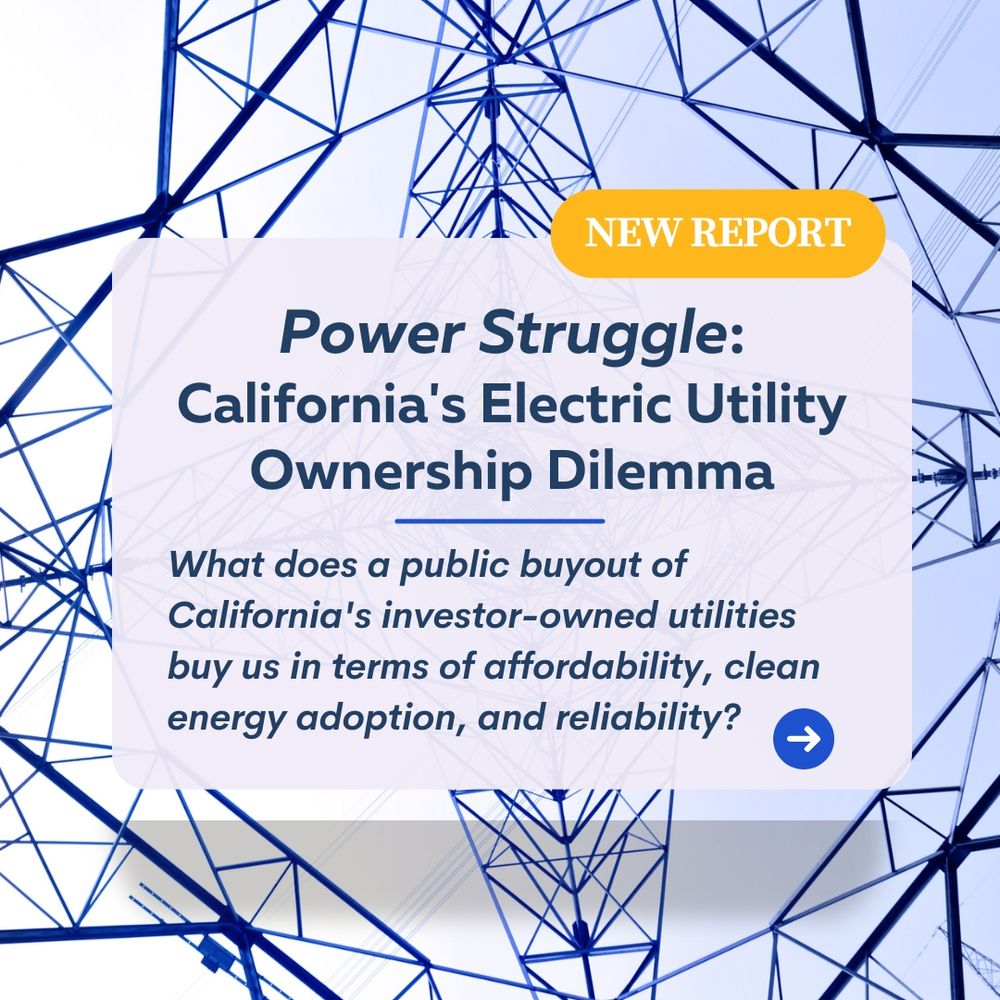Oh totally. We really made an effort to be balanced, and in doing so some of these things get missed. I appreciate you pointing it out. And the good word!
27.06.2025 20:11 — 👍 2 🔁 0 💬 0 📌 0
That's a good critique. I wrestled with that a little while writing.
27.06.2025 17:01 — 👍 1 🔁 0 💬 1 📌 0
27.06.2025 17:01 — 👍 1 🔁 0 💬 0 📌 0
Are public utilities the answer to California's electric sector woes? It's complicated. Check out a new paper that I helped draft for UCLA's Emmett Institute for answers.
18.06.2025 20:04 — 👍 0 🔁 0 💬 0 📌 0

Cover page featuring an electric grid
California’s investor-owned utilities are under scrutiny for causing deadly wildfires and sky-high electricity rates. Would public ownership fix these electricity woes? Our new report by Ruthie Lazenby, @sylvieashford.bsky.social
and @surfswamy.bsky.social sheds light. 💡
➡️ ucla.in/3G5f8tW
18.06.2025 17:55 — 👍 8 🔁 6 💬 0 📌 3
Maybe he means it's a tax on all consumption and any reduction in economic activity would reduce global CO2 emissions??? Would need to account for changes in global production and consumption tho, as some of these goods will now flow to other countries.
07.04.2025 14:52 — 👍 0 🔁 0 💬 1 📌 0
The crux of the issue is that we've been funding growing costs of climate adaptation, wildfire resilience, through electric rates and designing electric rates inefficiently. The solutions are commensurate.
11.03.2025 15:59 — 👍 0 🔁 0 💬 0 📌 0
A big thanks to Abbie Weeks, now at RMI, for all her great work on this.
11.03.2025 15:58 — 👍 0 🔁 0 💬 1 📌 0
This report provides insight into how different utility asks should be funded, how IOUs in CA can be better regulated, and the role of rate design in providing incentives and achieving equitable outcomes
11.03.2025 15:57 — 👍 0 🔁 0 💬 1 📌 0
NRDC just published research identifying causes of and solutions to steeply rising electricity prices in CA, with a focus on PG&E. Keeping electricity affordable is essential in itself and a prerequisite to decarbonization.
11.03.2025 15:55 — 👍 2 🔁 0 💬 1 📌 1
A good case study of what happens when politics, policy, and economic efficiency collide. What's the median outcome, what's gained, and what's lost.
18.02.2025 18:39 — 👍 0 🔁 0 💬 0 📌 0
Selectively.
10.02.2025 21:02 — 👍 1 🔁 0 💬 0 📌 0

Guess What Didn’t Kill Rooftop Solar?
California’s solar industry is doing just fine despite their complaints about net energy metering reform. There is a new administration in DC producing a raft of misguided actions to bolster fossil…
My EI blog post today addresses the claim from CA's rooftop solar industry that the 2023 change in net energy metering rules devastated their business. State's DG database shows it didn't. Just pulled forward sales to beat the new policy.
energyathaas.wordpress.com/2025/01/27/g...
#EnergySky
27.01.2025 15:37 — 👍 17 🔁 8 💬 1 📌 1
You recommend a marginal abatement cost approach for jurisdictions with environmental and/or GHG reduction goals?
22.01.2025 19:53 — 👍 0 🔁 0 💬 0 📌 0
Not very. You can check out the CPUC SB 695 report to get an idea. I think there was an attempt to link with the tax board, but it wasn't successful. So, IGFC. The wildfire fund is like an insurance fund.
19.01.2025 19:12 — 👍 0 🔁 0 💬 1 📌 0
The issue is that most grid related costs, especially in CA, aren't caused by usage. Think of all the billions of $$ spent on wildfire mitigation measures like tree trimming. How to collect those costs is a policy decision. If you want to solve for equity, then you'd do something like the IGFC.
19.01.2025 04:59 — 👍 0 🔁 0 💬 1 📌 0
Thanks :)
18.01.2025 00:39 — 👍 0 🔁 0 💬 0 📌 0
True, but note that utilities sell their long term contracted power back into the spot market. CAISO dispatches all resources. Difference between long term contract price and the spot price is passed on to or collected from ratepayers.
17.01.2025 04:09 — 👍 0 🔁 0 💬 1 📌 0
I understand where you're coming from and possibly the disconnect. Maybe, if less driving was the primary goal then the tool would be a tax on gasoline. I think the goal here is less driving in and out of a specific region during certain times (or something like that).
10.01.2025 17:08 — 👍 0 🔁 0 💬 0 📌 0
The drivers also include: presence of clean energy/ renewable policy goals, and resource potential.
07.01.2025 23:38 — 👍 1 🔁 0 💬 0 📌 0
This needs to be done separately for different regions of interest. The total soft costs, and what these soft costs are made of, will be very different in California versus Arizona versus Minnesota for example.
02.01.2025 22:52 — 👍 1 🔁 0 💬 0 📌 0
The soft costs vary by region. One way to estimate the total is to look at NREL's ATB reports that do a bottom-up calculation of what it could ideally cost to install rooftop solar, look up actual installation costs from the tracking the sun report (LBNL?), then take the difference between the two.
02.01.2025 22:50 — 👍 1 🔁 0 💬 1 📌 0
Part of it is the state utility regulator's job to ensure that utilities comply with resource adequacy/ have enough capacity to serve all loads including newer loads. There are some regions where regulators have less influence on this matter ofc.
29.12.2024 17:54 — 👍 0 🔁 0 💬 0 📌 0
IMHO it's good to deviate from what's economically efficient if there are strong policy reasons to do so. Just be upfront about it, what the pros and cons are. Leads to better decision making.
28.12.2024 15:44 — 👍 0 🔁 0 💬 0 📌 0
Fair, and this is a common retort to economic analysis. Note that my response was to the statement that 'other solutions may be more efficient.' Policy priorities are real, and it's important to talk about them as such. Not mix up with efficiency of outcomes.
28.12.2024 15:43 — 👍 0 🔁 0 💬 1 📌 0
PTO to the max, come back and push back to the max. Above is just what math says and there is enough economic research on this. Disagreements are about policy priorities.
28.12.2024 15:19 — 👍 0 🔁 0 💬 1 📌 0
I disagree but I'm enthusiastic to change my mind when I see better evidence. Hopefully from your research. The problem with a lot of advocacy in this space is that they confuse what costs are marginal to usage versus marginal to other things. I need to write a paper on this. 2025 goals.
28.12.2024 15:17 — 👍 0 🔁 0 💬 0 📌 0
Mathematically it's impossible to be more economically efficient and progressive than (1) pricing usage at social marginal cost and (2) collecting all residual utility revenue from the tax base. All other methods are second best with tradeoffs.
28.12.2024 15:12 — 👍 0 🔁 0 💬 1 📌 0
You can say highly contested again ;)
28.12.2024 15:08 — 👍 0 🔁 0 💬 1 📌 0
I've seen a lot of "here's this artificial TOU structure that makes the math work out on our policy priority" which doesn't come close to addressing that basic question. You will likely find that different tools get better results in different regions.
28.12.2024 15:07 — 👍 0 🔁 0 💬 1 📌 0
A leading environmental law & climate policy center. We develop solutions to urgent environmental challenges and educate future leaders | http://linktr.ee/emmettucla
DC. Laws, the environment, things of that nature
Here to nerd out on energy policy. Occasional commentary on parenting and politics.
It’s never the right time, it’s always the right time, what are you going to do?
Views and posts are mine, not my employers.
Energy policy analyst and advocate for California consumers at The Utility Reform Network (TURN). Previously NRDC and Stanford.
Ex-software guy living in the SF Bay Area. Interested in the Energy Transition, with special emphasis in the power of consumers and their energy assets. Member of Menlo Park EQC. I write at https://pelegri.substack.com #EnergySky
Timberwolves/NBA writer for The Athletic. Also covering Vikings and other Minnesota sports stories of note. 2024 People Sexiest Man Alive.
Podcast: The Jon Krawczynski Show on TalkNorth Podcast Network.
Senior NBA writer for ESPN Andscape. Hoop
Hall of Famer. LSU Masters. SJSU BA. Kendall-Jackson Wines hoop-wine ambassador
Senior NBA writer for ESPN. Prior stops: Washington Post, New York Post. Proud St. Bonaventure alum.
NBA reporter for ESPN, always available for The Hoop Collective podcast, author of “The Wonder Boy”
NBA writer for The Associated Press. Other beats: Miami Hurricanes, USA Basketball, your Stanley Cup champion Florida Panthers and more. Give Jim Boeheim his wins back.
The People’s Insider. “Dark Horse” candidate. Subscribe to The Stein Line on Substack all your NBA reporting needs: https://marcstein.substack.com/ jakelouisfischer@gmail.com
I write for @TheAthletic. I live in the District. I worry about our future. Co-Editor, The Basketball 100; 2016 Curt Gowdy Award, Naismith Memorial Basketball Hall of Fame; 2016 Sam Lacy Award, National Association of Black Journalists.
NBA correspondent since 1994. Publisher: marcstein.substack.com. Inquiries: marcstein@substack.com
Senior NBA Insider. Fresno!!! cbhaynes6@gmail.com.
Applied economic theorist: competition and information. Chief Economist @LawEconCenter Price Theory Newsletter http://pricetheory.substack.com.
Current: NBA Data Science @ Penn Interactive.
Author: “The Midrange Theory”
Prev: Director of Basketball Research @
Milwaukee Bucks. Dir. N. American Sports @ StatsBomb. NBA Analysis @ The Athletic

